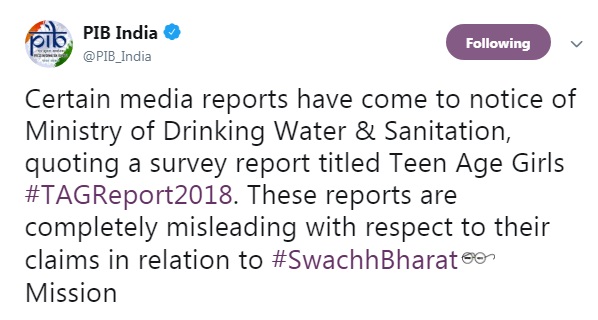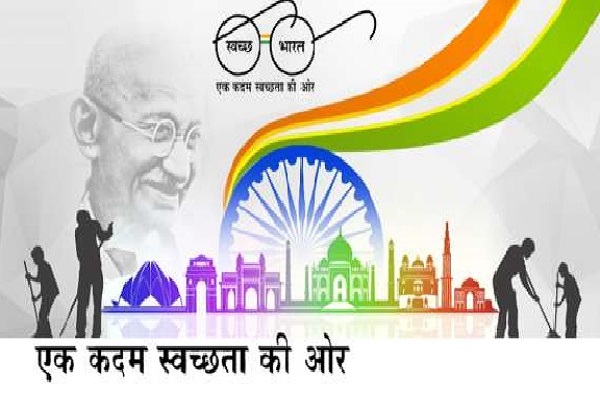Certain media reports have come to the notice of the Ministry of Drinking Water and Sanitation, quoting a survey report titled TAG (Teen Age Girls) Report 2018. These reports are completely misleading with respect to their claims in relation to the Swachh Bharat Mission. The reported survey claims that around 40 per cent of teenage girls in the country still have to practice open defecation.

(Also read: UIDAI introduces "Masked Aadhaar" feature to eAadhaar)
The media reports, however, do not mention the most important fact, i.e. the field survey was conducted in 2016-17. This leads to the factually incorrect and misleading conclusion that the survey was conducted recently and its findings reflect the current sanitation situation on the ground. By using data from 2016-17 to question the success of the Swachh Bharat Mission (SBM) today, the reports undermine the efforts and achievements of the people of India.
(Also read: One platform where you can lodge your Grievances for quick redress)
This error takes a serious dimension in the context of rural sanitation which has shown an unprecedented rise under the Swachh Bharat Mission. The fact that a basic detail like the period during which the field survey was carried out has not been distinctly mentioned in the report makes it misleading with respect to reporting on the progress of sanitation in today’s context.
(Also read: No Cost EMI is not interest free, know how No Cost EMI works)
The rural sanitation coverage under SBM has catapulted from 39% in October 2014 to over 95% today. The rapid pace of progress under the SBM means that performance data as measured by studies and surveys may become outdated within months. At the mid-point of the field survey period, i.e. January 2017, the sanitation coverage in rural India was below 60%, which is broadly consistent with the findings of the survey for that period – a fact that is not highlighted in the report itself.
(Also read: UIDAI accepts these documents for Aadhaar as Proof of Address, Identity and Date of Birth)
The Ministry of Drinking Water and Sanitation, therefore, underlines that the SBM is an extremely dynamic programme with rapidly accelerating progress. Researchers and authors are advised to exercise abundant caution before passing judgments on the success of the programme based on outdated data. They are also advised to clearly mention the period of the field survey and the statistical significance of any study that they quote so that their readers are not mislead. In case of any doubts, they may contact this Ministry for the latest facts and progress figures pertaining to the Mission. Various media are also similarly advised.
(Also read: CBDT releases Direct Tax Statistics)
Rural India has built over 8.7 crore toilets in their homes and over 5 lakh villages, 530 districts and 25 States/Union Territories have declared themselves free from the malaise of open defecation, as of October 2018.
(Also read: Online Safety Tips for Parents, Youngsters and Organisation)
(Also read: Government constitutes GoM to prevent and deal with sexual harassment at workplace)
(Also read: Home Ministry launches portal for reporting Online Sexual Abuse and Cyber Crimes)
(Also read: What is Sexual Harassment and its Punishment)
For more updates:
1. Like our Facebook Page
2. Join our Telegram Group
3. Join our Facebook Group
4. Subscribe to our Youtube Channel
5. Follow us on Twitter
6. Follow us on Instagram
Disclaimer: The above post includes some content used from PIB India website and executed on this website for fair use only. As this website is of educational nature, hence the content is used for education and awareness to the public.

